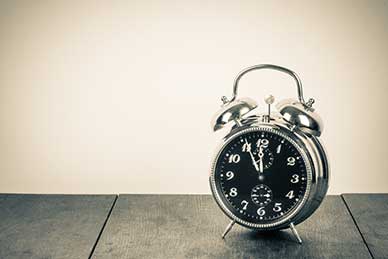Around 60 percent of American adults take a prescription drug and even more take over-the-counter medications as well. Could recognizing the link between the time of day we take our medications and their efficacy in treating disease, a groundbreaking practice called chronotherapy, make our meds more effective?
Your prescription bottle lists the name of your medication, dosage and whether the medication is to be taken with food or not. However, many medications work best when taken at certain times during the sleep-wake cycle. In fact, new studies indicate that timing of administration may be one of the most important factors in determining how well many medications work and how often we suffer from side effects. In the future, your prescription bottle may soon tell you when to take your meds for the best effects.
What Is Chronotherapy?
In simple terms, chronotherapy is the science of timing medications so they are present at the times of day when they are likely to be the most effective and/or cause the fewest negative effects. Our bodies run by internal clocks that control not just when we sleep and wake but also when we make lipids, when our cells divide and more. Timing medications when they are present during crucial parts of our metabolism can mean more therapeutic effects at lower doses.
How does this work in real life? Consider, for example, the common example of medications for hypertension, also known as high blood pressure. Blood pressure has its own circadian rhythm, typically peaking in the morning, when cortisol is at its highest. But in many people with high blood pressure, their blood pressure also fails to decrease at night. Because of this, many people may benefit from taking their hypertension medications at bedtime for best effects. In fact, a study of hypertension medications found that taking at least one anti-hypertensive medication at bedtime can improve control of hypertension and reduce the risk of a future cardiovascular event. Hypertension medications are not the only ones that may have a greater effect when taken at certain times; treatments for osteoarthritis, heartburn and other medications have been found to work best when taken at certain times of the day.
When Does Timing Matter?
The time of day affects much more than whether we are awake or sleeping. Every cell in the human body runs on a circadian, or 24-hour, clock. When our eyes stop perceiving light, our bodies make melatonin that helps us to sleep and also tells the body that it is time for critical repair of our cells and DNA. In the early light of dawn, our bodies begin to make cortisol, a hormone associated with stress but also involved in wakefulness and mental function.
What does this mean for our medications? Medications that are meant to target rapidly multiplying cells, such as immune cells and cancer cells, may work best when taken when these cells are dividing most rapidly. In addition, as seen in the example of hypertension medications, taking meds at the point in our daily hormonal cycle that we need them most may allow patients to get the same effects with a lower dosage and with fewer side effects. We have only just begun to discover how timing may affect the efficacy of medications, leading many researchers and physicians to request further study in this area.
Timing Is Everything
 In medications, as in comedy, timing may indeed be an important factor in how we respond to treatments that both make us more comfortable and extend our lifespans. Timing also is important when it comes to leading a healthy lifestyle. People who eat late at night, for example, reset the circadian clocks in their livers and pancreases. This can mess up their circadian rhythms for days to come.
In medications, as in comedy, timing may indeed be an important factor in how we respond to treatments that both make us more comfortable and extend our lifespans. Timing also is important when it comes to leading a healthy lifestyle. People who eat late at night, for example, reset the circadian clocks in their livers and pancreases. This can mess up their circadian rhythms for days to come.
Taking medications at the wrong time may have the same effect, although this matter definitely needs more study in order to get a definitive answer. Our circadian rhythm affects the cells of our body, but our cells also affect our circadian rhythm. The communications between different cells and systems are so well-regulated that even small changes can have huge systemic effects. Stifling the liver by eating at odd times of day can lead to increased lipids in the bloodstream and thus to higher cholesterol and triglycerides, which in turn can cause damage to the heart and blood vessels. The cells in our bodies function independently but also as parts of a whole. Understanding this back-and-forth play between different systems will be essential to figuring out how chronobiology may improve our lives in the future.
Most of us do not plan to be dependent on prescription medication, but most of us will be taking it at some point in our lives. New discoveries on how timing affects medication metabolism and effects may allow us to take lower doses and get more effects in the very near future. Chronotherapy just may be the future of pharmacology.


